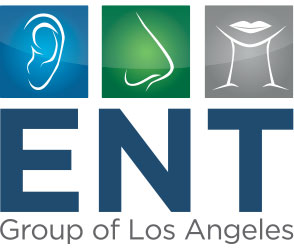Allergies & Sinusitis
The physicians and staff of the ENT Group of Los Angeles have put together the following resources in order to better assist you.
Allergies
Ear, nose and throat (ENT) allergies, like other types of allergies, are extremely common. Allergic reactions of all kinds are triggered by an abnormal response of the immune system when it mistakes an innocuous substance for a serious threat. While most allergic symptoms of this type are relatively mild, untreated ear, nose and throat allergies should not be ignored because they may lead to more significant medical problems.
Causes Of ENT Allergies
ENT-allergy sufferers, although seemingly reacting to allergens, are actually being attacked by their own immune systems. When an allergic individual is exposed to an allergen, her or his body produces antibodies and releases a variety of chemicals, including histamine. Histamine is the chief precipitating cause of allergic response. In many cases, an allergic response to the allergen will not occur immediately upon exposure, but only after a certain threshold of exposure is reached. While the underlying causes of allergies are unknown, they are known to be hereditary.
Common allergens responsible for ENT allergies are present in the air, and may include dust, mold, animal dander and pollen. Allergies to plant pollens and mold can be seasonal, occurring only when certain plants or trees are in bloom, or when mold is produced by rotting leaves. Such allergies are also affected by weather conditions, particularly humidity and wind, and are commonly referred to as hay fever.
Symptoms Of ENT Allergies
Most allergies of the ear, nose and throat result in mild symptoms, which may, nonetheless, interfere with normal activities. Nasal rhinitis may result in sneezing, nasal congestion or a runny nose. Individuals with ear, nose and throat allergies may also suffer from headaches, and itching and soreness in the throat and ears. More severe reactions to ear, nose and throat allergies, including anaphylaxis, are far less common but may be life-threatening.
Treatment Of ENT Allergies
Allergy treatments are usually prescribed in the form of over-the-counter or prescription antihistamines. Antihistamines prevent the release of histamine and help to reduce symptoms. Decongestants and nasal sprays are also sometimes prescribed to clear nasal passages and improve breathing. Sometimes, allergy shots are recommended to gradually create a tolerance in the patient to the allergen. This is known as immunotherapy. By far, the most effective treatment for allergies of the ear, nose and throat is to avoid the offending allergens, but that is not always possible.
Limiting outdoor activities during certain seasons, avoiding contact with particular animals, wearing sunglasses and frequently washing the hands may reduce the severity of symptoms. For patients who have allergies to indoor allergens, such as dust and mold, it may be helpful to keep the indoor environment clean and to avoid the accumulation of moisture. Not using carpeting, in which mold can easily grow, may also be helpful.
For more information on any of our services please call (844) 4-ENTDOC (844) 436-8362.
